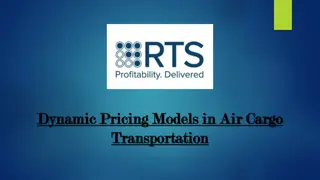
The Impact of Geopolitical Factors on Global Cargo Pricing
In an interconnected global economy, the cargo industry is a critical backbone, ensuring the smooth flow of goods across borders. However, this intricate web of logistics and supply chain management is highly susceptible to geopolitical factors that can significantly influence cargo pricing. Understanding these influences, particularly through the lens of dynamic pricing strategies, is essential for businesses to navigate the complexities of the global market.n
Download Presentation

Please find below an Image/Link to download the presentation.
The content on the website is provided AS IS for your information and personal use only. It may not be sold, licensed, or shared on other websites without obtaining consent from the author. Download presentation by click this link. If you encounter any issues during the download, it is possible that the publisher has removed the file from their server.
E N D
Presentation Transcript
The Impact of Geopolitical Factors on Global Cargo Pricing The Impact of Geopolitical Factors on Global Cargo Pricing
In an interconnected global economy, the cargo industry is a critical backbone, ensuring the smooth flow of goods across borders. However, this intricate web of logistics and supply chain management is highly susceptible to geopolitical factors that can significantly influence cargo pricing. Understanding these influences, particularly through the lens of dynamic pricing strategies, is essential for businesses to navigate the complexities of the global market. Geopolitical Instability and Cargo Geopolitical Instability and Cargo Pricing Pricing Geopolitical instability is a primary factor impacting global cargo pricing. Conflicts, political unrest, and trade wars can disrupt supply chains, leading to increased costs and delays. For instance, the trade war between the United States and China led to increased tariffs, which directly impacted shipping costs. Carriers faced higher operating expenses due to tariffs on imported goods, which were then passed on to consumers in the form of higher cargo prices.Similarly, regional conflicts, such as those in the Middle East, can disrupt major shipping routes like the Suez Canal. Any blockage or threat in these key maritime passages can cause significant rerouting of cargo ships, leading to longer transit times and increased fuel costs. These added expenses inevitably result in higher cargo pricing.
Economic Sanctions and Trade Policies Economic Sanctions and Trade Policies Economic sanctions and changing trade policies also play a crucial role in shaping cargo pricing. Sanctions against countries such as Iran and Russia limit the ability to trade freely, leading to a reduction in available shipping routes and increased insurance costs for vessels willing to operate in sanctioned regions. This reduction in route options and the heightened risk associated with sanctioned areas drive up the cost of cargo transport. Trade policies, including tariffs and import/export regulations, directly impact the cost structure of global shipping. For example, the implementation of stricter environmental regulations on maritime emissions by the International Maritime Organization (IMO) in 2020, known as IMO 2020, required ships to use cleaner, more expensive fuels. This regulatory change increased operational costs for shipping companies, which, in turn, influenced global cargo pricing. The Role of Dynamic Pricing in Cargo Management The Role of Dynamic Pricing in Cargo Management In the face of such geopolitical uncertainties, dynamic pricing emerges as a vital strategy for managing cargo pricing effectively. Dynamic pricing, a model that adjusts prices based on real-time supply and demand, allows carriers and logistics providers to respond swiftly to changing geopolitical conditions. By leveraging advanced analytics and real-time data, dynamic pricing models can anticipate shifts in the market and adjust prices accordingly. For example, during a geopolitical crisis that affects a key shipping route, a dynamic pricing system can quickly increase prices to reflect the scarcity of available cargo space and the heightened risk associated with the route. This approach ensures that shipping companies can maintain profitability even in volatile conditions.
Moreover, dynamic pricing can help balance the load across different routes by incentivizing shippers to choose less congested or risky paths. By offering lower prices for alternative routes, carriers can optimize their capacity and reduce the strain on more heavily impacted regions. Adapting to a Changing Landscape Adapting to a Changing Landscape To thrive in an environment where geopolitical factors constantly influence global cargo pricing, businesses must adopt flexible and responsive strategies. Implementing dynamic pricing models is a critical step in this direction. By utilizing technology and real-time data, companies can better predict market fluctuations and adjust their pricing strategies to mitigate the impact of geopolitical events. Additionally, diversifying supply chains and investing in alternative routes can provide a buffer against geopolitical disruptions. Companies that can quickly adapt to changing conditions by rerouting shipments or sourcing from different regions will be better positioned to maintain stable cargo pricing. In conclusion In conclusion, geopolitical factors play a significant role in shaping global cargo pricing, creating a complex and often unpredictable landscape for the cargo industry. However, by embracing dynamic pricing strategies and leveraging real- time data, businesses can navigate these challenges more effectively. Dynamic pricing not only enables companies to respond quickly to market changes but also allows them to optimize their operations in the face of geopolitical uncertainties.
The Future of Cargo Pricing in a Geopolitically Complex World The Future of Cargo Pricing in a Geopolitically Complex World Looking ahead, the cargo industry will continue to face geopolitical challenges that affect global pricing. Trade agreements, regional conflicts, and international policies will remain key influencers. As global trade becomes more intertwined with geopolitical events, the importance of adaptive pricing strategies, like dynamic pricing, will only grow. The integration of advanced technologies such as artificial intelligence (AI) and machine learning (ML) in dynamic pricing models promises to enhance the precision and responsiveness of cargo pricing strategies. These technologies can analyze vast amounts of data, including geopolitical developments, market trends, and logistical constraints, to forecast price changes and optimize routes more accurately. Furthermore, increased collaboration between industry stakeholders, including shipping companies, logistics providers, and governments, can help mitigate the impact of geopolitical factors on cargo pricing. By sharing information and resources, the industry can develop more resilient supply chains and pricing strategies that withstand geopolitical pressures. In summary In summary, the impact of geopolitical factors on global cargo pricing is significant and multifaceted. By adopting dynamic pricing models and leveraging technological advancements, the cargo industry can better navigate these challenges, ensuring more stable and predictable pricing. As the world continues to evolve, the ability to adapt to geopolitical changes will be crucial for maintaining the efficiency and profitability of global cargo operations.
THANK YOU THANK YOU






















